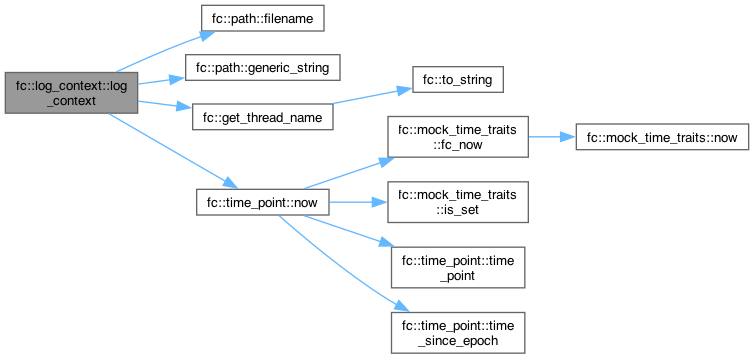provides information about where and when a log message was generated. More...
#include <log_message.hpp>
Public Member Functions | |
| log_context () | |
| log_context (log_level ll, const char *file, uint64_t line, const char *method) | |
| ~log_context () | |
| log_context (const variant &v) | |
| variant | to_variant () const |
| string | get_file () const |
| uint64_t | get_line_number () const |
| string | get_method () const |
| string | get_thread_name () const |
| string | get_task_name () const |
| string | get_host_name () const |
| time_point | get_timestamp () const |
| log_level | get_log_level () const |
| string | get_context () const |
| void | append_context (const fc::string &c) |
| string | to_string () const |
Detailed Description
- See also
- FC_LOG_CONTEXT
Definition at line 55 of file log_message.hpp.
Constructor & Destructor Documentation
◆ log_context() [1/3]
| fc::log_context::log_context | ( | ) |
Definition at line 42 of file log_message.cpp.
◆ log_context() [2/3]
| fc::log_context::log_context | ( | log_level | ll, |
| const char * | file, | ||
| uint64_t | line, | ||
| const char * | method ) |
Definition at line 45 of file log_message.cpp.

◆ ~log_context()
| fc::log_context::~log_context | ( | ) |
Definition at line 87 of file log_message.cpp.
◆ log_context() [3/3]
|
explicit |
Definition at line 57 of file log_message.cpp.

Member Function Documentation
◆ append_context()
| void fc::log_context::append_context | ( | const fc::string & | c | ) |
Definition at line 80 of file log_message.cpp.

◆ get_context()
| string fc::log_context::get_context | ( | ) | const |
Definition at line 176 of file log_message.cpp.
◆ get_file()
| string fc::log_context::get_file | ( | ) | const |
Definition at line 168 of file log_message.cpp.
◆ get_host_name()
| string fc::log_context::get_host_name | ( | ) | const |
Definition at line 173 of file log_message.cpp.
◆ get_line_number()
| uint64_t fc::log_context::get_line_number | ( | ) | const |
Definition at line 169 of file log_message.cpp.
◆ get_log_level()
| log_level fc::log_context::get_log_level | ( | ) | const |
Definition at line 175 of file log_message.cpp.

◆ get_method()
| string fc::log_context::get_method | ( | ) | const |
Definition at line 170 of file log_message.cpp.
◆ get_task_name()
| string fc::log_context::get_task_name | ( | ) | const |
Definition at line 172 of file log_message.cpp.
◆ get_thread_name()
| string fc::log_context::get_thread_name | ( | ) | const |
Definition at line 171 of file log_message.cpp.
◆ get_timestamp()
| time_point fc::log_context::get_timestamp | ( | ) | const |
Definition at line 174 of file log_message.cpp.
◆ to_string()
| fc::string fc::log_context::to_string | ( | ) | const |
Definition at line 74 of file log_message.cpp.

◆ to_variant()
| variant fc::log_context::to_variant | ( | ) | const |
Definition at line 179 of file log_message.cpp.
The documentation for this class was generated from the following files:
- libraries/fc/include/fc/log/log_message.hpp
- libraries/fc/src/log/log_message.cpp